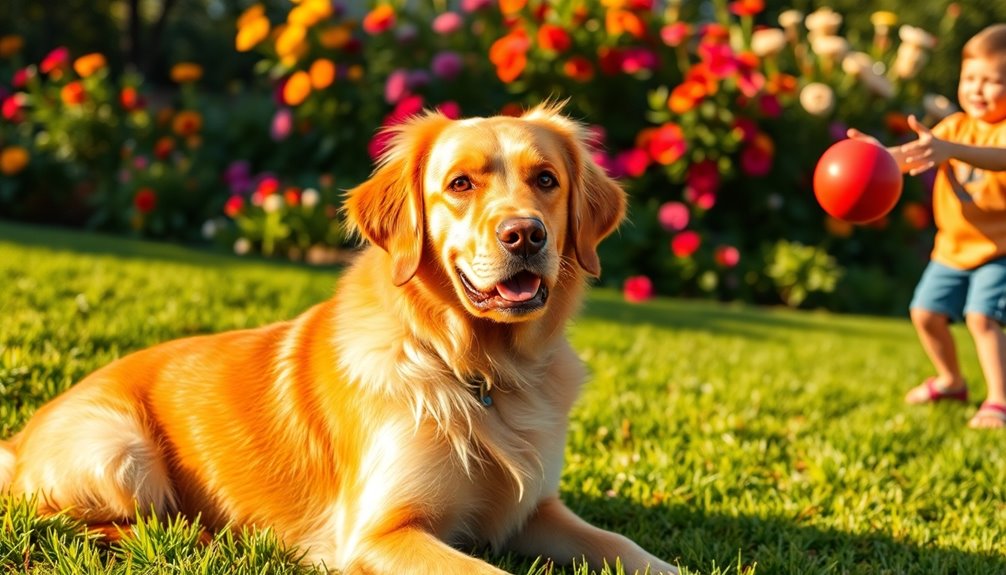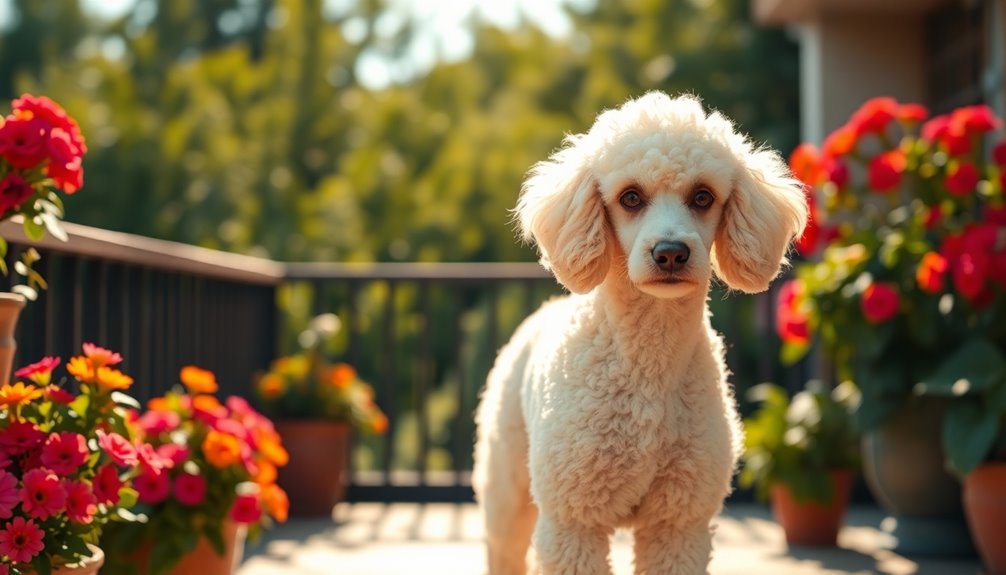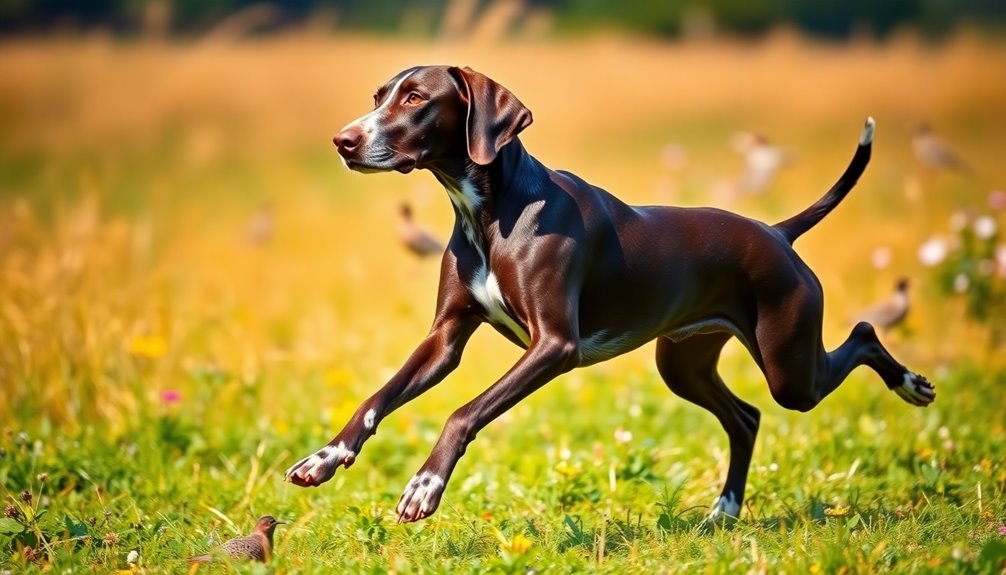If you're looking for the perfect family dog, the Golden Retriever might just be your best bet. Known for their loyalty and friendly nature, they easily fit into family life. These intelligent pups excel in obedience training and are incredibly tolerant of children, making them ideal companions. With a need for about two hours of exercise daily, they thrive on activity and love. Their rich history and charming looks only add to their appeal. Curious about what else makes this breed so beloved? You'll discover more about their care, health, and unique traits ahead!
Key Takeaways
- Golden Retrievers are known for their friendly and affectionate nature, making them ideal companions for families with children.
- Their intelligence and eagerness to please facilitate easy training, promoting good behavior in family settings.
- High energy levels require regular exercise, ensuring they remain healthy and engaged with family activities.
- Their adaptability allows them to thrive in various living environments, from apartments to expansive homes.
- Golden Retrievers excel in therapy roles, providing emotional support and companionship in diverse settings.
Introduction
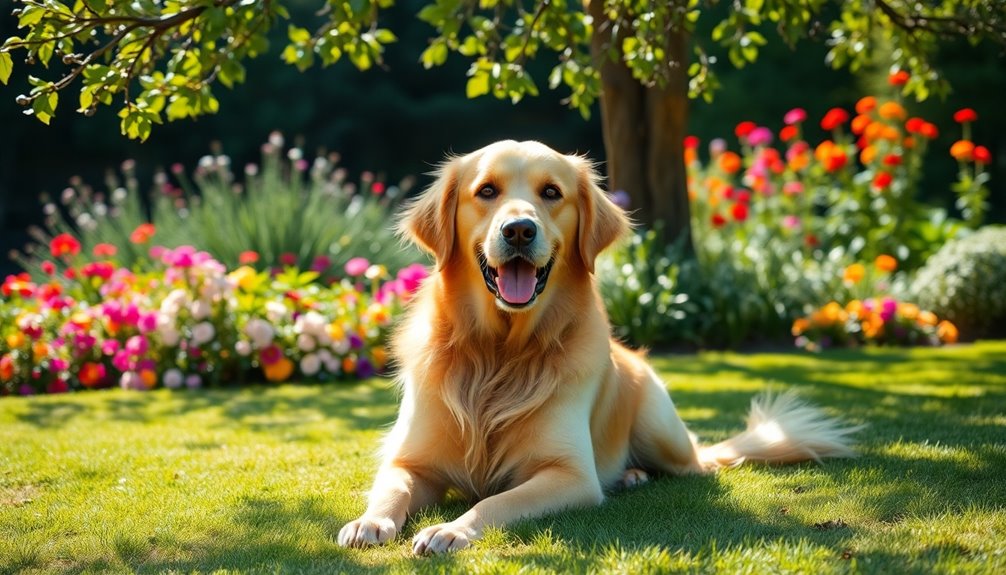
When it comes to family pets, few breeds can match the charm and loyalty of the Golden Retriever. With their broad heads, dark eyes, and powerful muzzles, these dogs have a striking appearance that captures hearts. Their large black noses and slightly drooping flews add to their overall appeal, complemented by their moderate-sized ears that hang gently by their sides.
Beyond their looks, Golden Retrievers boast a temperament that's hard to resist. Intelligent and affectionate, they're known for being calm and biddable, making them easy to train. Their natural inclination to please means they thrive on positive reinforcement, quickly picking up commands and excelling in obedience training. With their gentle and affectionate nature, Golden Retrievers truly make excellent family pets.
They're also incredibly tolerant of children, which makes them a favorite among families. While most Golden Retrievers lack guarding instincts due to their friendly nature, it's essential to be aware that some lineages may show aggression due to genetic factors.
It's no surprise they're the most searched-for dog breed in the U.S., loved by families and owned by celebrities alike. With their intelligence and kind demeanor, Golden Retrievers truly embody what it means to be a perfect family companion.
History and Origin
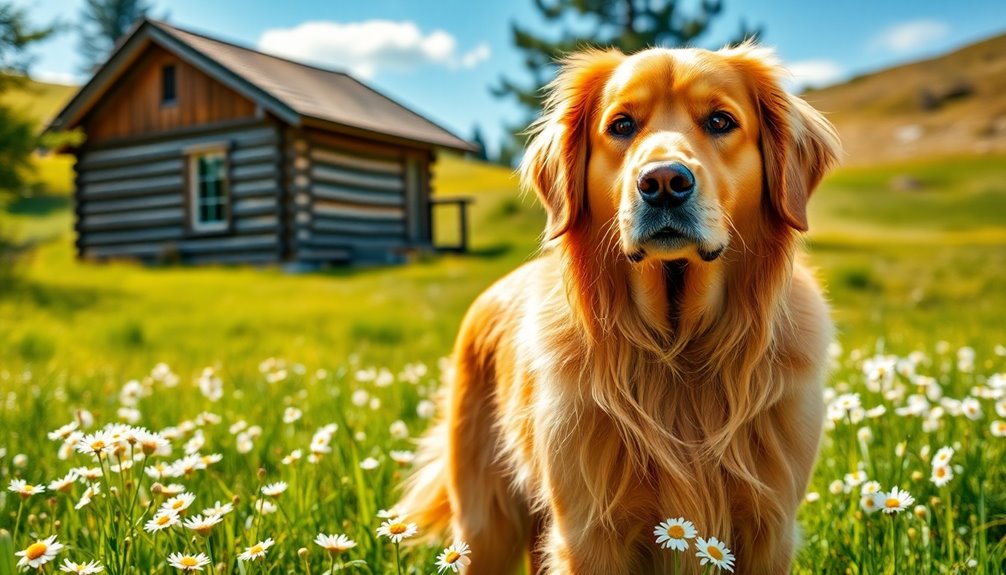
The Golden Retriever's history begins in 1864 when Lord Tweedmouth sought to create a versatile hunting companion. Originating in Scotland, this breed was designed specifically for retrieving game from water, showcasing its natural swimming ability and gentle temperament. As you learn more about its development, you'll see how careful breeding shaped the Golden Retriever into the beloved family dog we know today. The first mating, which involved a yellow Flat Coated Retriever and an extinct Tweed Water Spaniel, laid the foundation for the breed's unique characteristics.
Where and when the breed originated
Originating in the mid-19th century, the Golden Retriever was developed by Lord Tweedmouth at his estate, Guisachan, near Inverness, Scotland.
The breeding initiative kicked off in 1864 when he acquired a yellow Flat Coated Retriever named Nous. Interestingly, Nous was the sole yellow puppy in a litter of black wavy-coated Retrievers, obtained from a cobbler in Brighton as payment for a debt.
The initial mating between Nous and a Tweed Water Spaniel named Belle, now extinct, laid the foundation for the Golden Retriever breed. This early development was documented in the Lord Tweedmouth's Stud Book, revealing the breed's true lineage.
Following this, the offspring from that first mating were further bred using outcrosses with other breeds, including the Irish Setter and additional Tweed Water Spaniels.
To achieve the desired traits, Lord Tweedmouth also utilized selective inbreeding. The goal was to create a powerful, energetic, yet gentle and trainable dog.
Retrieving Game From Water
Retrieving game from water has been a vital skill for Golden Retrievers since their inception. This breed emerged from a mix of several ancestral breeds, each contributing unique qualities.
You'll find the now-extinct Tweed Water Spaniel, which enhanced their agility and water retrieving capabilities. The Flat-Coated Retriever also played a significant role, adding keen hunting skills to the mix. Additionally, Red Setters, Black Wavy-Coated Retrievers, and Newfoundland dogs were crossed in to boost the Golden Retriever's hunting prowess, particularly in water.
These dogs were specifically developed to retrieve game birds from both land and water, boasting exceptional scenting abilities and a strong prey drive. Their soft mouths allow them to carry and deliver game gently, an essential trait for any retrieving dog. The breed's versatility and beloved nature have contributed to its popularity as a service dog and family companion.
With their thick, water-resistant coats, Golden Retrievers can work in various conditions, including cool and cold weather.
Training is crucial for these dogs, as they thrive on mental stimulation and regular exercise. With an hour of strenuous activity daily, including swimming, you'll help maintain their physical health while honing their natural talents in retrieving game from water.
Physical Characteristics

When you look at a Golden Retriever, you'll notice their size and weight vary, with males typically weighing between 60 to 75 pounds and females 55 to 65 pounds. Their beautiful, feathery coat comes in various shades of gold, adding to their charm. Additionally, they have a dense, water-repellent double coat that provides excellent insulation and protection while they retrieve waterfowl. You can also spot their long, straight tail, which they carry with pride, perfectly complementing their sturdy build.
Size, weight, and coat details
Golden Retrievers stand out with their impressive size and striking appearance, making them a beloved choice for families. Adult males typically weigh between 65-75 pounds, while females range from 55-65 pounds. It's important to maintain a healthy weight to prevent obesity and related health issues, which can be influenced by factors like age, activity level, and overall health. Regular veterinary care is essential to monitor their health and wellness throughout their lives.
In terms of height, male Golden Retrievers stand 23-24 inches tall at the shoulder, while females measure 21.5-22.5 inches. They usually reach their full height between 9-12 months of age, presenting a symmetrical and powerful build.
Puppies grow rapidly during their first year, with males weighing around 60-70 pounds by 12 months, and females reaching 50-60 pounds. By 8 months, they're nearly full-sized, tipping the scales at about 50 pounds.
Golden Retrievers are known for their thick, golden brown coats that are long on the neck, thighs, tail, and back of the legs. Their athletic build and gentle nature make them not just beautiful but also functional, especially as skilled swimmers developed for retrieving game.
Feathery Tail and Coat
With their feathery tails and luxurious coats, Golden Retrievers are truly a sight to behold. Their tails, set high on their bodies and naturally long, rarely stop wagging, often causing their whole bodies to wiggle with excitement.
You'll notice that the direction of their wagging reflects their emotional states; when they wag to the right, it's typically a sign of happiness or attraction, while left-sided wagging might indicate fear or discomfort. Research has shown that dogs' tail wagging indicates emotional states, with right-side wagging correlating to positive feelings.
The coat of a Golden Retriever is equally impressive, featuring feathery hair on their front legs, chest, back, thighs, and tails. This breed boasts a thick undercoat and a dense, water-repellent outer layer that helps them thrive in various environments.
However, their stunning coats do require regular maintenance. To prevent matting, you should brush them daily, especially during shedding seasons, and give them regular baths to keep their fur clean.
Regular grooming isn't just about looks; it's also essential for their health. Check their ears weekly for signs of infection, trim their nails once or twice a month, and remember to brush their teeth regularly.
Temperament and Personality
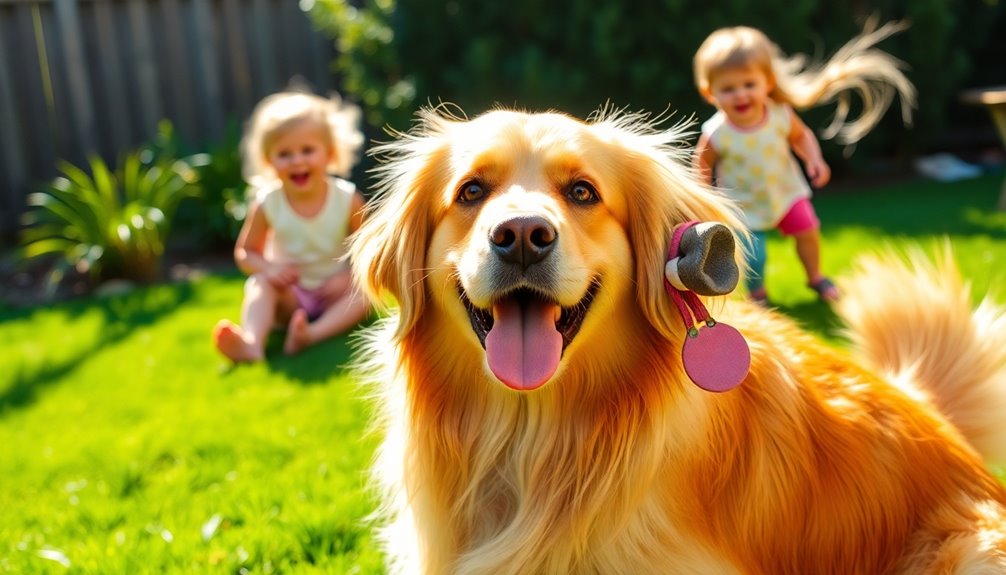
When you think of a Golden Retriever, you picture a playful and friendly companion ready to brighten your day.
Their affectionate nature makes them perfect for families, individuals, and even other pets, creating a harmonious environment wherever they go. These dogs require high exercise needs, which can contribute to their playful and energetic personalities.
With their easygoing demeanor, these dogs truly embody the spirit of a devoted family member.
Playful and Friendly Demeanor
Known for their playful and friendly demeanor, Golden Retrievers truly embody the spirit of companionship. Their gentle and affectionate nature makes them a joy to have around. You'll find that they're calm and biddable, which makes training a breeze.
While they lack guarding instincts, their loyalty and sociability shine through, making them excellent family members. Golden Retrievers are also known for their sociable and affectionate nature, which further enhances their role as beloved family pets.
These dogs thrive on playfulness, especially during their puppy years. With high energy levels, regular exercise and mental stimulation are essential to prevent destructive behavior. You can engage them with toys, mind puzzles, or treat games, ensuring they stay entertained.
As they age, you'll notice a shift; they become more reserved and calm, yet still retain their playful spirit.
Golden Retrievers are incredibly friendly, getting along well with children and other pets. Their patience and tolerance make them ideal companions for families. Plus, they're obedient on a leash and welcoming to strangers.
Their intelligence and eagerness to please make them highly trainable, and they excel in various roles, including therapy and support animals. With a Golden Retriever, you'll enjoy a loyal friend who brings joy and warmth to your home.
Suitability for families, individuals, or other pets
Golden Retrievers make fantastic companions for families, individuals, and other pets due to their adaptable temperament and loving personality. They integrate seamlessly into various family dynamics, connecting with each member on a personal level, and adjusting their behavior according to the mood around them.
Their patience and tolerance make them ideal for families with children, as they share a special bond characterized by play and mutual respect. Additionally, they thrive in environments where they can engage in positive reinforcement training, which enhances their ability to learn and adapt.
These dogs are highly intelligent and easily trainable, enhancing family bonding through engaging training sessions. With early obedience training, they develop good manners and adapt well to household routines. Their natural inclination towards kindness allows them to fit into various family dynamics and coexist well with other pets.
Regular exercise and mental stimulation are crucial for their health and happiness, so activities like fetch and swimming help keep them vibrant and integral to family life.
For individuals, Golden Retrievers offer unwavering companionship, thriving in diverse living situations, whether in bustling cities or quiet neighborhoods. Their loyalty and emotional support make them perfect for active individuals or those seeking a comforting presence. Moreover, their gentle nature allows them to coexist harmoniously with other pets, making them a versatile choice for any household.
Health and Lifespan
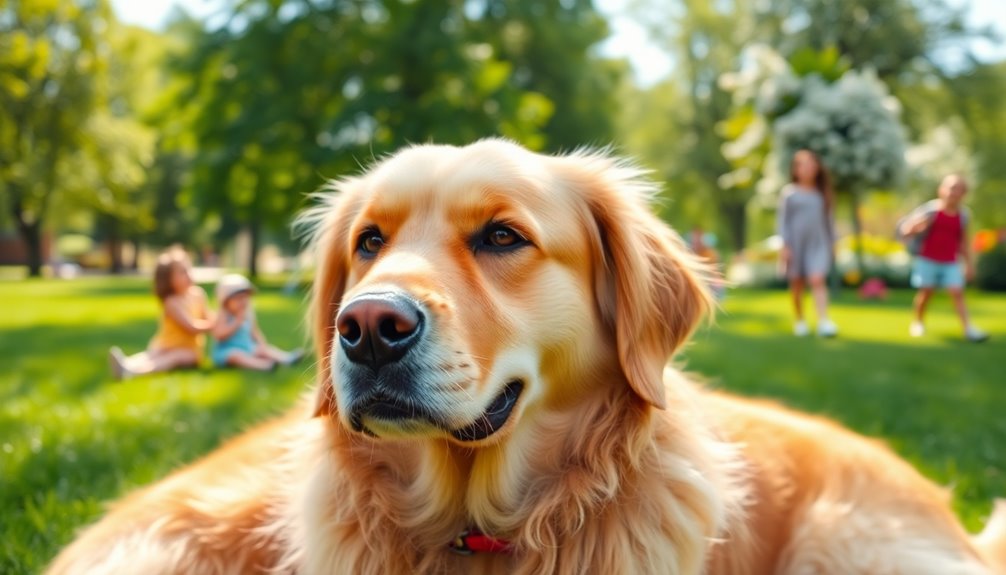
When it comes to your Golden Retriever's health and lifespan, you should know they typically live between 10 to 12 years, with some living even longer with the right care. This breed is prone to specific health issues, like hip dysplasia and heart problems, so staying proactive about their wellbeing is crucial. Regular vet check-ups are essential for monitoring their health and catching potential issues early, ensuring a longer life for your Golden Retriever's longevity.
Typical lifespan of the breed
For families considering a Golden Retriever, understanding the breed's typical lifespan is essential. Golden Retrievers generally live between 10 to 16 years, with the average lifespan often cited as 10 to 12 years.
With good nutrition, regular exercise, and routine checkups, some can exceed 16 years. However, factors like weight and activity levels can influence individual lifespans.
Larger dogs, such as male Golden Retrievers, may have shorter lifespans, although this isn't an absolute rule. Improper breeding can also contribute to a reduced lifespan for this breed.
Interestingly, genetic factors, particularly variants of the HER4 gene, can extend a Golden Retriever's life by nearly two years, especially in females. Research indicates that the average lifespan of dogs with beneficial variants is approximately 13.5 years, highlighting the impact of genetics on longevity.
The potential for longevity is notable; the world's oldest Golden Retriever lived to be 20 years old. While many can reach ages of 15 or 16 with proper care, there's variability based on genetics, health, and even luck.
Ultimately, providing your Golden Retriever with a healthy lifestyle and regular veterinary care can help them achieve a longer, happier life.
Common health concerns or genetic predispositions
Understanding common health concerns and genetic predispositions can significantly impact your Golden Retriever's well-being and longevity.
As a breed, Golden Retrievers are prone to several musculoskeletal issues, like hip and elbow dysplasia, which can cause pain and mobility challenges. Keeping an eye on their weight through a balanced diet and regular exercise helps prevent these problems. Regular checkups can aid in early diagnosis of musculoskeletal concerns, ensuring timely intervention if issues arise.
Heart conditions, such as aortic stenosis and cardiomyopathy, are also common. Regular veterinary checkups are essential for early detection and management of these issues.
Skin allergies, including seborrhea and atopic dermatitis, can lead to discomfort. You should monitor for signs of itching or irritation and consult your vet for possible dietary changes or medicated shampoos.
Additionally, Golden Retrievers may face hypothyroidism, eye conditions like cataracts, and even certain cancers. Obesity can exacerbate many health concerns, so maintaining a healthy weight is crucial.
Lastly, floppy ears can lead to ear infections, necessitating regular cleaning and veterinary care. Staying informed about these health risks allows you to take proactive steps to ensure your furry companion lives a happy, healthy life.
Tips for maintaining health and wellness
How can you ensure your Golden Retriever stays happy and healthy throughout its life? Start by providing high-quality dog food that's balanced in protein, carbs, fats, vitamins, and minerals.
Tailor the diet to your dog's age and activity level to prevent obesity, limiting treats to 10% of daily calories. Remember to feed adult Goldens twice daily and always keep fresh water available.
Next, commit to daily exercise—aim for at least one hour split into two sessions.
Mix activities like walks, runs, and fetch, and consider swimming and agility training for variety. Monitor the weather, especially in heat, to avoid overexertion. Daily exercise also promotes joint health and mental stimulation.
Regular veterinary check-ups are essential for early detection of health issues.
Stay current with vaccinations, parasite control, and dental care. Keep an eye on your dog for any signs of health problems.
Finally, don't overlook grooming and socialization.
Brush your Golden 2-3 times a week, bathe every 6-8 weeks, and socialize from a young age to foster a well-rounded, happy companion. Additionally, ensuring proper hydration is crucial for maintaining your dog's overall health and vitality.
Care Requirements

Taking care of a Golden Retriever involves regular brushing, adequate exercise, and a balanced diet. You'll need to commit to at least two hours of exercise daily and pay attention to their grooming needs to keep them healthy and happy. Feeding them the right amount of high-quality food is essential for maintaining their energy levels and overall well-being. Regular health screenings are also important to minimize breed-related health risks.
Regular Brushing Required
Regular brushing is essential for keeping your Golden Retriever's coat healthy and beautiful. Aim to brush your dog at least 2-3 times a week, increasing to daily during heavy shedding seasons. Consistent brushing helps prevent tangles and mats, distributing natural oils that keep the coat shiny. Plus, it significantly reduces shedding in your home.
For effective grooming, use a slicker brush to remove loose hair and untangle any knots. An undercoat rake is helpful for getting rid of dead undercoat, while a bristle brush can give the coat a smooth finish. Medium and wide-toothed combs can assist with additional grooming. Always brush in the direction of hair growth to avoid causing discomfort.
Pay special attention to areas behind the ears, under the legs, and around the tail, as these spots are prone to matting. Regular grooming not only keeps your dog looking great, but it also allows you to detect skin issues early. Additionally, maintaining a balanced diet is vital for promoting a shiny coat and overall skin health, which can enhance the benefits of your grooming routine.
Exercise requirements and energy levels
Exercise is crucial for keeping your Golden Retriever happy and healthy. These energetic dogs need 60 to 120 minutes of exercise each day, depending on their age and temperament. For puppies, frequent, shorter bursts of activity are best to prevent overexertion.
Adult Golden Retrievers thrive on longer sessions, while older dogs typically require gentler, 30-45 minute workouts. It's important to note that mental stimulation is as crucial as physical exercise for overall well-being.
Incorporate a variety of exercises to keep your Golden engaged. Activities like running, jogging, hiking, or swimming are excellent choices. Don't forget mental stimulation, too! Puzzles and interactive games, along with classic fetch, will keep their minds sharp.
Long walks that allow for exploration are particularly beneficial, as are playtimes in yards or dog parks.
Be mindful of your dog's energy levels. Golden Retrievers are high-energy and can become hyperactive without regular activity, leading to behaviors like jumping and chewing.
Adjust their exercise routine based on their age and health. Monitor for signs of fatigue, especially in puppies and seniors. By providing the right amount and type of exercise, you'll promote a calm, well-behaved, and healthy companion.
Feeding tips and diet recommendations
Properly feeding your Golden Retriever is essential for their overall health and happiness. Start by providing high-quality protein sources like lean meats, fish, and eggs to support muscle maintenance and vitality. Including high-quality protein in their diet is crucial for healthy muscle development and repair.
Include healthy fats, such as omega-3 and omega-6 fatty acids from fish oil or flaxseed, to promote a shiny coat and healthy skin. Carbohydrates from whole grains, vegetables, and fruits offer energy and fiber, aiding digestion.
For adult Goldens, feed 2 to 3 cups of dry food daily, split into two meals. Puppies need multiple small meals, around 3-4 times a day, to support their growth. Adjust portions based on age, size, and activity level to prevent obesity.
As your dog ages, transition to an adult diet around one year, focusing on joint health and balanced energy. For seniors, adjust their diet for slower metabolism and consult your vet about possible supplements.
Always provide constant access to clean water, and choose AAFCO-compliant foods that avoid fillers and additives. Finally, consider healthy treats like carrot sticks or blueberries for extra nutrients without excess calories.
Your Golden will thrive with a well-balanced diet!
Training and Socialization
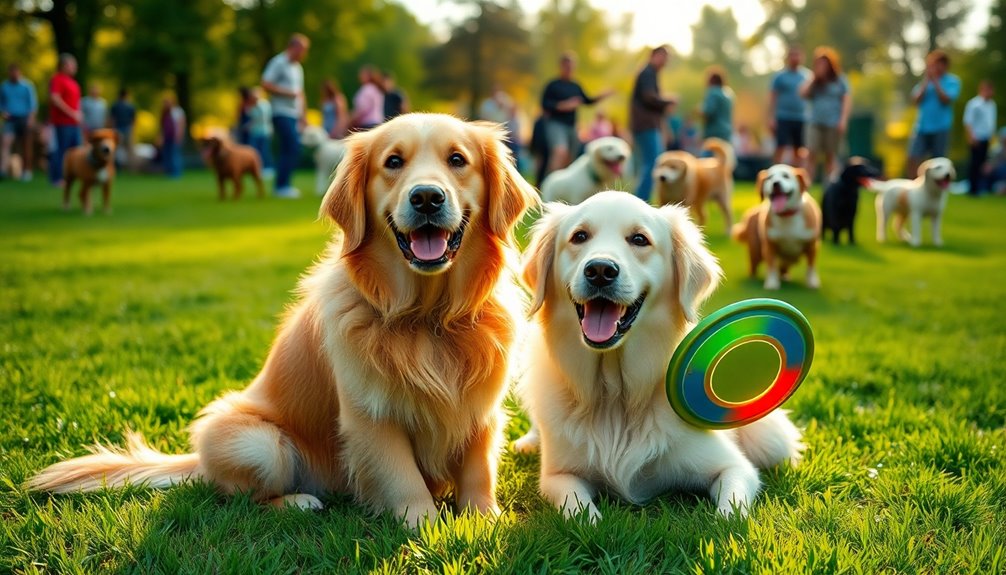
Training and socialization are crucial for your Golden Retriever, as they're highly trainable and eager to please. Start with gradual introductions to new environments to build their confidence and reduce anxiety. Early training prevents the development of bad habits, which can contribute to a well-behaved adult dog. It's also important to be aware of separation anxiety in puppies, ensuring they feel secure when you're not around.
Highly Trainable and Eager
Many dog owners find that Golden Retrievers are incredibly trainable and eager to learn, making them a top choice for families. Ranked as the 4th most intelligent dog breed, these dogs can learn new commands in as few as five repetitions. Their eagerness to please means they excel in obedience training and quickly adapt to a variety of tricks. You'll find that training sessions can be short and enjoyable, filled with positive reinforcement techniques like treats and praise.
Starting training as early as 8 weeks old sets the foundation for a well-behaved dog. With their gentle nature, Golden Retrievers respond remarkably well to consistent training and positive reinforcement, allowing them to pick up commands swiftly. Additionally, their high cognitive abilities enable them to excel in various dog sports and competitions, showcasing their remarkable learning potential.
While their mischievous streak may sometimes lead to distractions, patience is key, especially during their adolescent stage when they can become more independent and energetic.
Gradual Introductions to New Environments
Introducing your Golden Retriever to new environments can be an exciting yet delicate process. Start by familiarizing your puppy with different areas of your home. Let them explore various rooms, surfaces, and objects to build their confidence. As you do this, gradually introduce new items like toys or blankets to help them adapt to change. Soothing music can also create a calming atmosphere.
When venturing outside, begin in quiet spots like your backyard or a serene park. Observe your puppy's reactions and adjust based on their comfort level. Using familiar toys or games in these new settings can ease their anxiety and promote exploration. Keep initial outings short, rewarding calm behavior with treats and praise. Early socialization during the sensitive period is crucial for your puppy's long-term adaptability.
Expose your Golden Retriever to different sounds and sights at home and outdoors. Start with household noises, then move to outdoor sounds like traffic or birds, gradually increasing the volume. Let them experience various surfaces, rewarding their calm demeanor.
Consistent training in new environments reinforces socialization skills. Set realistic goals for each session and use positive reinforcement to create a favorable association with new experiences. This gradual approach will help your puppy adjust and thrive.
Separation Anxiety in Puppies
Separation anxiety can be a challenging issue for Golden Retriever puppies, impacting their ability to feel secure when left alone. To prevent this, start with short practice sessions lasting 5-10 minutes to keep your puppy engaged without overwhelming them. Establishing consistent training routines helps your puppy feel more secure during periods of separation.
Create a safe enclosure where they can feel comfortable and not trapped. Gradually increase separation durations, starting with just a few seconds and building up over time.
Establish a consistent routine around departures to help your puppy understand that you'll always come back. Use positive reinforcement like treats and clicker training to reward good behavior.
Make leaving and returning neutral events—don't make a fuss, as this can heighten anxiety.
To distract your puppy, provide interactive toys and leave some background noise, like a radio or TV, on while you're gone. Consider using webcam monitoring to observe their behavior when you're away.
If necessary, engage a pet sitter or doggie daycare during initial training phases. Finally, consult a veterinarian if the anxiety persists, ensuring your puppy feels safe and secure during your absences.
Ideal Living Environment
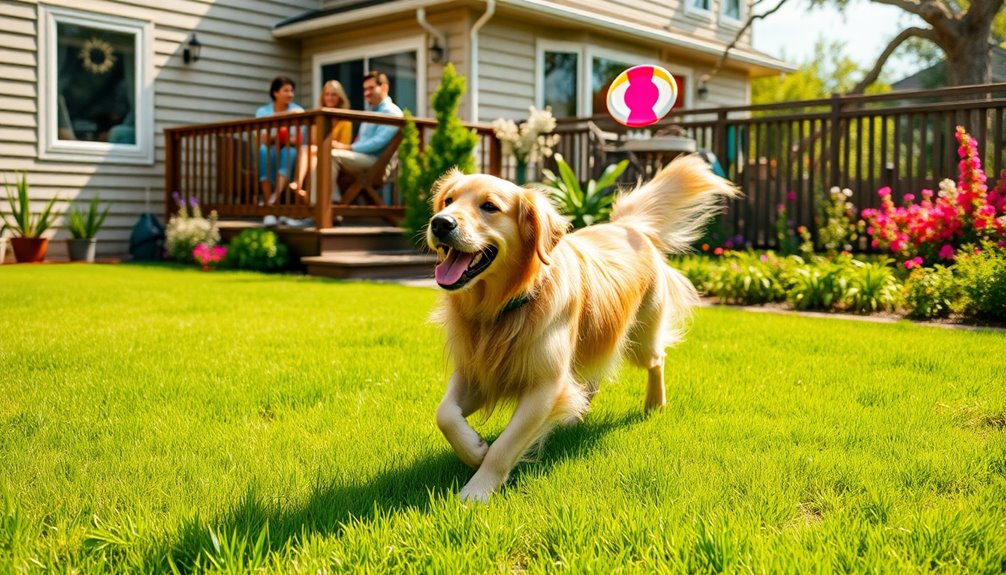
If you're considering a Golden Retriever, you'll want a spacious backyard where they can run and play. This breed thrives best in moderate temperatures year-round, making it essential to provide a comfortable living environment. Their energetic nature means they require ample space for exercise and playtime to remain happy and healthy.
Spacious Backyard for Exercise
A spacious backyard is essential for Golden Retrievers, as it provides the perfect environment for their exercise needs.
These energetic dogs require at least two hours of exercise daily, which can easily include walks around your backyard. Short strolls interspersed with play sessions are especially beneficial for puppies, helping them develop strong muscles and joints while exploring new smells.
Playing games like fetch, tug-of-war, or hide-and-seek keeps them entertained and mentally stimulated. Golden Retrievers love retrieving, making fetch an ideal choice for burning off energy. Engaging your kids in playtime not only strengthens family bonds but also ensures your dog gets the exercise they need. Additionally, regular physical activity helps to establish routines and release stored energy, contributing to overall well-being.
If you have access to a pool or a safe body of water, swimming is a fantastic low-impact exercise that helps maintain muscle strength without straining their joints.
Incorporating agility training or obedience exercises can challenge their intellect while keeping them physically fit.
In your spacious backyard, combining daily walks, playtime, swimming, and training sessions creates a fulfilling routine that meets your Golden Retriever's physical and mental health needs.
Prefers Moderate Temperatures Year-Round
After ensuring your Golden Retriever gets plenty of exercise in the spacious backyard, it's important to provide an ideal living environment that keeps them comfortable year-round. Aim for a room temperature between 68-75°F (20-24°C), similar to what humans prefer. This consistency is essential for their overall well-being and helps reduce the risk of heat or cold stress. Additionally, providing regular outdoor activity is vital for their mental and physical health.
When it comes to outdoor activities, be mindful of the temperature. In hot weather, avoid prolonged exposure during the hottest parts of the day. Always provide ample shade and fresh water. Conversely, in cold conditions, protect your dog from extreme temperatures with warm shelter or doggy jackets, and limit outdoor time during freezing weather. Opt for exercising during cooler hours, like early mornings or late evenings.
Humidity levels also play a crucial role in your Golden's comfort. Maintain humidity between 30% to 50%. High humidity can lead to heat exhaustion, while low humidity may cause skin irritation.
Always watch for signs of temperature-related discomfort, such as excessive panting or shivering, and adjust the environment accordingly to keep your furry friend happy and healthy.
Golden Retrievers Excel in Therapy

Golden Retrievers aren't just beloved family pets; they also shine in therapy settings due to their exceptional abilities. Their keen sense of smell can be a game-changer in various situations, and their friendly demeanor makes them stars in emotional support. Their gentle temperament allows them to remain calm in stressful situations, which is essential for effective therapy work. You'll see how these traits combine to create a powerful presence in therapy work, making a real difference in people's lives.
Exceptional Scent Detection Abilities
Scent detection is a remarkable ability that sets Golden Retrievers apart as exceptional therapy dogs. With around 200 to 300 million olfactory receptors, these dogs are equipped to outsniff humans, who only have six million. Their olfactory epithelium is significantly larger, allowing them to detect odorant molecules a million times more efficiently than you can.
This unique anatomy, coupled with a specialized organ called Jacobsen's organ, enhances their ability to detect specific scents and pheromones. In fact, dogs' brains process scent information differently, which further improves their scent discrimination abilities.
Golden Retrievers undergo rigorous training using reward-based methods to hone their scent detection skills. They're adept at identifying a variety of scents, from human remains to medical conditions like cancer and diabetes. Their training involves introducing target scents and gradually increasing the difficulty, ensuring they're precise in their detection.
In medical settings, these dogs can diagnose diseases with astonishing accuracy. For instance, they can detect certain cancers from breath samples with over 90% sensitivity.
Their incredible scent detection abilities not only make them valuable in various roles but also enhance their effectiveness as therapy dogs, providing emotional support through their keen sense of smell.
Air Bud's Iconic Canine Star
When it comes to therapy dogs, few can rival the charm and effectiveness of the Golden Retriever, a breed that has captured hearts in both real life and popular culture, such as the beloved character from "Air Bud." Known for their friendly and gentle nature, these dogs excel in providing emotional support and companionship to those in need. Their sociable temperament allows them to thrive on human interaction, making them perfect therapy partners. The high incidence of divorce among individuals with Borderline Personality Disorder can create additional emotional challenges where therapy dogs can provide essential comfort.
Golden Retrievers are intelligent and empathetic, easily sensing and responding to human emotions. Their patient demeanor shines in stressful environments, helping to create a calming presence. The training process for therapy work can take from six months to two years, ensuring they possess reliable obedience and good leash manners. Additionally, over 50,000 therapy dogs are currently providing emotional support across various settings in the U.S.
Once they pass the Canine Good Citizen test, they earn certification from reputable organizations. These therapy dogs visit nursing homes, hospitals, and schools, providing comfort to people facing various challenges.
They play vital roles in reducing anxiety, lowering blood pressure, and offering companionship to those feeling lonely or depressed. By improving mental stimulation and social behaviors, Golden Retrievers truly stand out as exceptional therapy dogs that enhance the well-being of many.
Active Family Lifestyle Needed?
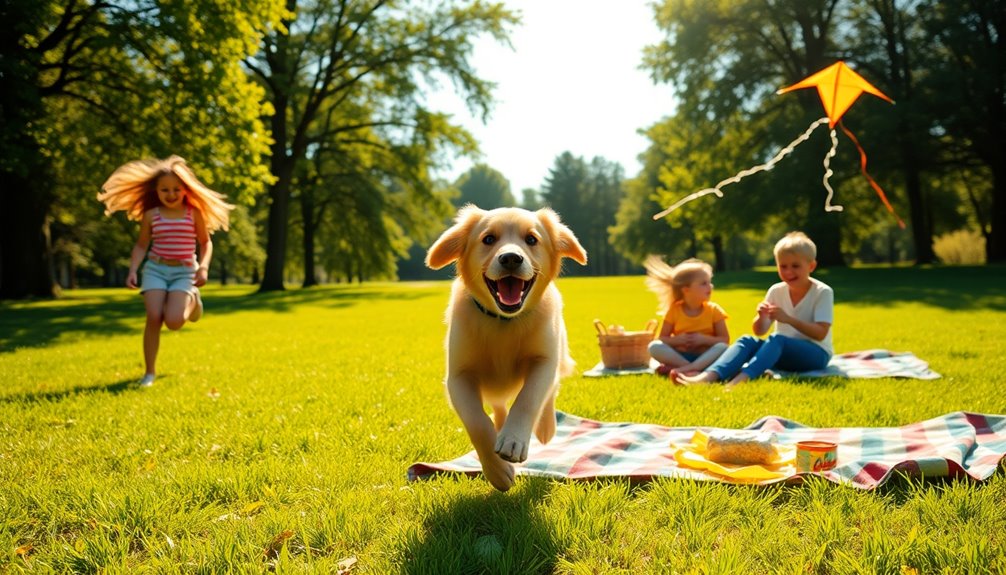
If you're considering a Golden Retriever, be ready for an active lifestyle. These dogs thrive in households that can commit to regular exercise and training, ensuring they stay healthy and happy. You'll find that engaging with your furry friend not only benefits them but also strengthens your family bond. Their high energy levels require ample exercise and mental stimulation to keep them content and well-adjusted. Regular grooming can also help manage pet hair effectively, making your home more comfortable for everyone.
Ideal for Active Households
Golden Retrievers thrive in active households where daily exercise is part of the routine. These dogs need a minimum of two hours of good exercise each day, spread across multiple sessions. For adults, aim for 40 to 120 minutes, while puppies require five minutes of exercise for each month they've been alive, up to a year. Engaging them in activities like walking, running, and playing fetch is essential for their physical and mental health. Their gentle temperament makes them especially great companions for children during these active playtimes.
Their high energy levels make them perfect companions for outdoor adventures, such as hiking and swimming. Regular exercise not only keeps them fit but also curbs undesirable behaviors like destructive chewing and excessive barking. Plus, they're great playmates for active children.
Golden Retrievers adapt well to various living situations, whether you have a yard or live in a small apartment, as long as they get enough exercise. They're typically quiet, so they won't disturb neighbors.
Time Commitment for Training
Training a Golden Retriever requires a significant time commitment, especially in an active family lifestyle. You'll need to dedicate short, focused training sessions of 5-15 minutes, several times a day, to keep your dog engaged. Consistency is crucial; set specific times for training each day to help your pup learn effectively.
Start with basic commands like "sit," "down," and "come" before moving to more advanced skills. It's also important to use consistent commands to reinforce learning and avoid confusion during training sessions.
Socialization should begin as early as 7-8 weeks, continuing up to 3 months. Expose your puppy to various environments, people, and sounds to develop good social skills. Consider enrolling in socialization classes for added interaction with other dogs.
Utilize positive reinforcement techniques, rewarding desired behaviors with treats, praise, or toys immediately after they occur. Celebrate small victories to keep the training enjoyable and motivating.
Finally, don't forget that Golden Retrievers need regular exercise, aiming for 30-60 minutes daily. Incorporate physical and mental stimulation through activities like fetch and swimming. Balancing training with exercise helps ensure a well-rounded, happy dog that thrives in an active family setting.
Frequently Asked Questions
Do Golden Retrievers Shed a Lot?
Yes, Golden Retrievers do shed quite a bit.
They've a double coat that leads to moderate shedding year-round, with heavy shedding during spring and fall as they adapt to temperature changes.
You'll notice a little hair daily, but seasonal peaks can result in more noticeable fur around your home.
Regular brushing and a balanced diet can help manage shedding, making it easier to keep your space tidy while enjoying your furry friend.
Can Golden Retrievers Live in Apartments?
Yes, Golden Retrievers can live in apartments, but you'll need to ensure they've enough space to move comfortably.
Daily exercise is crucial, so plan for walks, trips to parks, or playtime.
Providing mental stimulation through training sessions and interactive toys is essential to keep boredom at bay.
With proper organization and designated areas for sleeping and playing, your Golden can thrive even in a smaller living space.
Just keep them active and engaged!
What Colors Do Golden Retrievers Come In?
Golden Retrievers come in several recognized color varieties.
You'll find light golden, often described as cream or blonde, and the classic golden, which ranges from deep gold to lighter shades.
Dark golden coats can appear almost reddish, while red, although not officially recognized by the AKC, showcases a deep reddish-brown hue.
Are Golden Retrievers Good With Other Pets?
Yes, Golden Retrievers are generally good with other pets. Their friendly nature allows them to get along with various dog breeds and even cats.
When introducing them to new animals, you'll want to supervise interactions and introduce them gradually. Positive reinforcement, like treats and praise, encourages good behavior.
With proper training and socialization, they can develop strong bonds with other pets, making them great companions in a multi-pet household.
How Much Exercise Do Golden Retrievers Need Daily?
Golden Retrievers need about 60 to 120 minutes of exercise daily, depending on their age and temperament.
It's best to break this up into two or more sessions. Puppies require shorter, less intense activities, while seniors benefit from low-impact exercises.
Incorporate physical activities like running or swimming, along with mental stimulation through puzzles.
Always consult your vet to tailor an exercise plan that fits your dog's specific needs and health concerns.
Conclusion
In conclusion, Golden Retrievers truly embody the perfect family dog. Their friendly nature, intelligence, and loyalty make them a beloved companion for families of all sizes. With proper training, socialization, and a loving environment, these dogs can thrive and bring joy to your home. If you're ready for an active lifestyle and the commitment they require, a Golden Retriever could be the ideal addition to your family, enriching your lives with love and fun.

